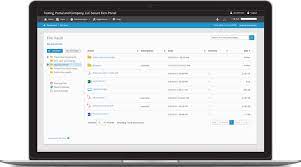Inside the World of a McDonald’s Software Engineer: Innovating Fast Food Technology
McDonald’s Software Engineer: Behind the Scenes of Fast Food Technology
In today’s digital age, even fast-food giants like McDonald’s rely heavily on technology to streamline operations and enhance customer experience. At the heart of McDonald’s technological advancements are its software engineers, who play a crucial role in developing and maintaining the systems that power one of the world’s most iconic brands.
The Role of a McDonald’s Software Engineer
A McDonald’s software engineer is responsible for designing, developing, and implementing software solutions that support various aspects of the company’s operations. From point-of-sale systems to mobile ordering apps, these engineers work tirelessly to ensure that McDonald’s technology infrastructure runs smoothly and efficiently.
One key area where software engineers at McDonald’s make a significant impact is in enhancing the customer experience. By creating user-friendly interfaces, optimizing order processing systems, and implementing innovative features like self-service kiosks and mobile payment options, these engineers help McDonald’s deliver a seamless and convenient dining experience to millions of customers worldwide.
The Skills Required
To excel as a software engineer at McDonald’s, individuals need a strong foundation in computer science, programming languages, and software development methodologies. Attention to detail, problem-solving skills, and the ability to work collaboratively with cross-functional teams are also essential traits for success in this role.
Moreover, given the scale and complexity of McDonald’s technology ecosystem, software engineers must be adept at managing large datasets, optimizing system performance, and staying abreast of emerging technologies to drive continuous innovation within the organization.
Career Opportunities at McDonald’s
Working as a software engineer at McDonald’s opens up a world of opportunities for professionals looking to make an impact in the fast-paced tech industry. Whether it’s developing cutting-edge solutions for digital menu boards or designing predictive analytics tools for supply chain management, there is no shortage of exciting projects for engineers to sink their teeth into at McDonald’s.
Additionally, with a global presence spanning over 100 countries, McDonald’s offers software engineers the chance to collaborate with diverse teams from around the world and gain valuable international experience that can further enhance their career growth.
Conclusion
As technology continues to revolutionize the way we interact with food service establishments, software engineers at McDonald’s play a vital role in shaping the future of fast food technology. By leveraging their technical expertise and creativity, these professionals help drive innovation and efficiency within one of the most recognizable brands on the planet.
So next time you place an order at your local McDonald’s restaurant or use their mobile app for quick pickup, remember that behind every digital interaction is a team of dedicated software engineers working tirelessly to make your dining experience as enjoyable and seamless as possible.
7 Essential Tips for Success as a McDonald’s Software Engineer
- Stay updated on the latest technologies and programming languages.
- Collaborate effectively with cross-functional teams.
- Prioritize tasks based on project requirements and deadlines.
- Test software thoroughly to ensure quality and reliability.
- Seek feedback from peers and seniors to improve coding skills.
- Attend relevant workshops or training sessions to enhance knowledge and skills.
- Stay organized by maintaining clear documentation of code and project details.
Stay updated on the latest technologies and programming languages.
To excel as a McDonald’s software engineer, it is crucial to stay updated on the latest technologies and programming languages. By continuously learning and adapting to industry trends, software engineers can enhance their skills, stay competitive, and contribute to innovative solutions that drive McDonald’s technological advancements. Keeping abreast of emerging technologies ensures that engineers can tackle new challenges effectively and deliver cutting-edge software solutions that meet the evolving needs of the fast-food industry.
Collaborate effectively with cross-functional teams.
Collaborating effectively with cross-functional teams is essential for McDonald’s software engineers to succeed in their roles. By working closely with colleagues from different departments, such as marketing, operations, and finance, engineers can gain valuable insights into the diverse needs and perspectives within the organization. This collaboration not only fosters innovation but also ensures that software solutions are aligned with the overall business objectives of McDonald’s. Through open communication, mutual respect, and a shared commitment to excellence, software engineers can leverage the collective expertise of cross-functional teams to deliver impactful technology solutions that drive the company forward.
Prioritize tasks based on project requirements and deadlines.
In the fast-paced world of McDonald’s software engineering, it is crucial for professionals to prioritize tasks effectively based on project requirements and deadlines. By carefully assessing the urgency and importance of each task, software engineers can ensure that they allocate their time and resources efficiently to meet project milestones and deliver high-quality solutions. Prioritizing tasks helps streamline workflow, enhance productivity, and ultimately contribute to the successful execution of projects within the fast-food technology landscape.
Test software thoroughly to ensure quality and reliability.
Testing software thoroughly is essential for ensuring quality and reliability in the fast-paced world of McDonald’s technology. Software engineers must conduct rigorous testing procedures to identify and address any potential bugs or issues before they impact the customer experience. By meticulously testing each component of the software, engineers can guarantee that McDonald’s systems operate smoothly, efficiently, and securely, ultimately delivering a seamless and satisfying dining experience for customers around the globe.
Seek feedback from peers and seniors to improve coding skills.
Seeking feedback from peers and seniors is a valuable tip for McDonald’s software engineers looking to enhance their coding skills. By actively soliciting input from colleagues with varying levels of experience, engineers can gain valuable insights, identify areas for improvement, and learn best practices that can help them write more efficient and effective code. Constructive feedback not only fosters a culture of collaboration and continuous learning within the team but also empowers engineers to refine their coding techniques and stay abreast of industry trends, ultimately contributing to their professional growth and the overall success of McDonald’s technology initiatives.
Attend relevant workshops or training sessions to enhance knowledge and skills.
Attending relevant workshops or training sessions is essential for McDonald’s software engineers to stay updated with the latest technologies and trends in the fast-paced tech industry. By participating in these educational opportunities, engineers can enhance their knowledge and skills, learn new tools and techniques, and network with other professionals in the field. This continuous learning approach not only benefits the individual engineer but also contributes to McDonald’s overall technological advancement and innovation efforts.
Stay organized by maintaining clear documentation of code and project details.
To excel as a McDonald’s software engineer, it is essential to stay organized by maintaining clear documentation of code and project details. By documenting code changes, system designs, and project specifications, software engineers can ensure better collaboration with team members, facilitate smoother troubleshooting processes, and enhance overall project efficiency. Clear documentation also serves as a valuable resource for future reference, enabling engineers to build upon existing work and maintain a structured approach to software development within the fast-paced environment of McDonald’s technology initiatives.











